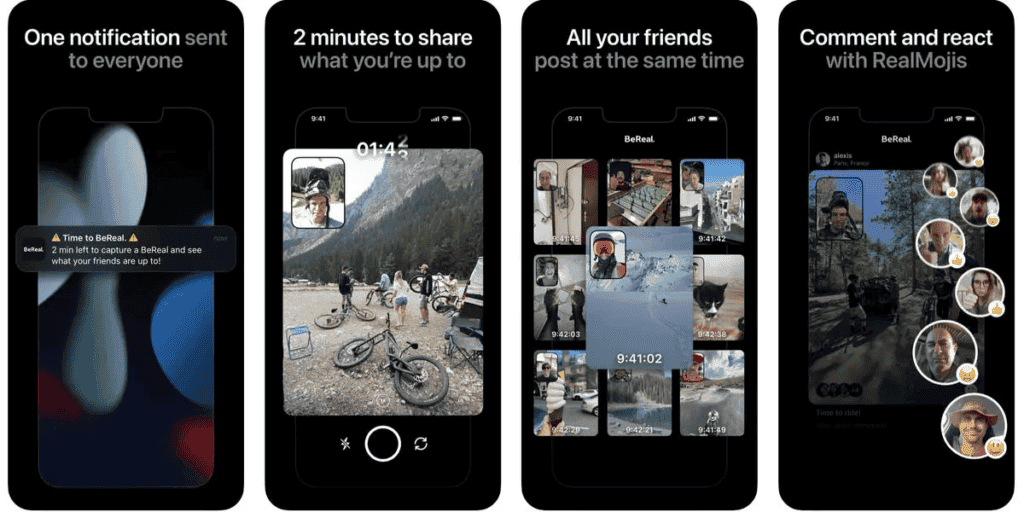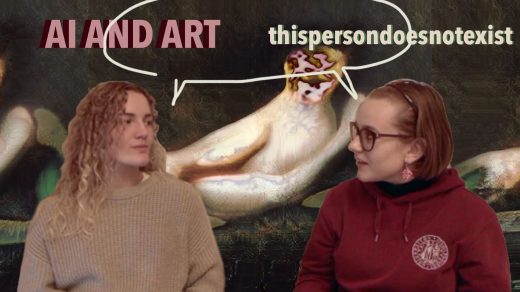BeReal, the new social media platform that has recently taken the world by storm, has already been the protagonist of several blog posts on this website. Also, I have already briefly shared my experience as a BeReal user by commenting in response to one of those posts. However, I thought it could still be interesting to discuss the platform in relation to the concept of online personas, and more specifically, in relation to how I am struggling to fit my online image within the unfiltered premise of BeReal. This post is the account of a personal, subjective and unconscious experience!
One notification, two minutes, x retakes
At this point, the majority of us knows how BeReal works: users get one notification a day, the famous “Time to BeReal”, and are given 2 minutes to post a picture of what they are doing, that is taken simultaneously from their front and back camera.

Users can also react to other people’s BeReals with “RealMojis”, which basically consist of miniature selfies. When I first heard about this new social media, I downloaded it with quite a positive mindset: there would be no infinite scrolling (which had already made me delete TikTok twice before) and it sounded like a genuine way to spontaneously share & connect with my friends.
When I received my first invitation to BeReal I was excited to be “part of the movement”. As I added more people to my network though, a realisation begun to dawn on me: I wasn’t ready to post such an un-curated version of myself.
Here is the thing: the two-minutes countdown only starts once users open up their notification, so you can take an unlimited amount of pictures in that given time. However, what I was not aware of is that other users can actually see how many retakes you have discarded. Once I realised that, I was not only overthinking how big my nose would look, or how the light would reveal my uneven skin, but also how others could see through my “fakeness”. If my BeReal had retakes behind it, that for sure would say something about my confidence, or about my ability to be genuine online (or at least that is what was going through my mind).
Every time I wouldn’t be able to capture a desirably spontaneous image of myself, I would give up posting altogether. And every time I wouldn’t post, my confidence in my appearance and, quite ironically, in my confidence itself, would decrease, leaving me to feel “not good enough” even for a platform where users are invited to come as they are.
Am I the problem?
For some time, I just let it go. I could definitely survive without participating in “being real”. However, my inability to post eventually made me challenge my whole relationship with “being seen” on social media altogether. I observed that my Instagram profile had already been showing symptoms of an unwillingness to put myself under the scrutiny of other users. As a matter of fact, in comparison to a couple of years back, the number of photographs that portrayed myself cut in half.
Now, there is nothing wrong with not posting pictures of yourself on your Instagram page: I love to share posts portraying my friends and family, the places I visit, the food I cook, etc. All of those posts operate as visual love letters to a certain friend, a given place, a moment that I hold dear in my heart… What saddened me was realising that I had become more and more reluctant to address such love letters to myself. The act of being photographed itself already made me feel insecure, and the disappointment that would follow seeing the taken photo discouraged me from posting. Moreover, if I managed to obtain a photo that I actually liked and that I decided to post, I would start feeling anxious about the amount of likes I would get, and would check my phone constantly to see how the post would be doing.
Turns out, my struggles with Be(ing)Real are likely rooted in my fear of not “performing” well enough while being exposed to the invisible gazes of other users. I had tried so hard to paint a confident, laid-back, yet (superficially) genuine online persona, that my real self was not enough anymore. Ironically, I was comparing myself to a version of “me” that was made up of conflated aspects of my personality, and that at the end of the day, did not exist.
Collecting my thoughts
Part of me wants to challenge my need to be real, to be confident in the most genuine version of myself, in front of such a wide audience. Where do we draw the line between the private, the parts of yourself that only the people closest to you will see, and the public persona, the parts of yourself that surface when interacting with acquaintances or even strangers? At the end of the day, I am not the same Nina with my mom that I am with my close friends, and a different Nina interacts with guests at work than the one that talks to classmates at university: different nuances of my personality will surface in different contexts. Wouldn’t that be valid for my online presence as well?
Maybe the problem is our obsession with “being real”, or our striving for an appearance of authenticity; or maybe the problem is that behind a screen it is too easy to construct an image for ourselves that is different from who we actually are (even if not necessarily fake).
Now, when I get my BeReal notification, I push myself to post so that I can prove that I have no issue with showing a “real” version of myself ( even if I still have my doubts about the whole concept).
How have you been dealing with Be(ing)Real?



Reading your post made me think more critically about my attitude toward my online presence. Right now, when I tried opening the app to see the last time I’d posted anything on BeReal, it hit me with the forced snapshot and 2-minute timer and I shut it off quickly. I claim to be ‘too lazy’ to invest time in an Instagram post or keep up with the daily notifications of BeReal. However, it’s my perfectionism that’s stopping me from presenting myself online. Posting literally takes less than 2 minutes, unless you strive for the perfect image.
On top of that, not posting anything at all prevents you from worrying about criteria. Yet forcing myself to post to fight that insecurity also seems so conflicting to me. For who am I doing this if not for myself?
Thanks for being so open and honest about your thoughts on BeReal! I have never heard of the platform before, and my initial thought when reading your post was “that sounds like a nice change of pace from other social media platforms”
Then I continued reading and I totally get how the app makes you rethink your online persona. When the notification to post pops up at the wrong timing, of course you wouldn’t feel inclined to share. Some things are just are just personal. With other social media platforms like instagram, at least you’re in charge of what and when you’re going to post. I think BeReal can be fun when sharing it with people you know, like friends and family, but
– not with a wider audience (comment cut me off)